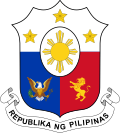| Type | Visa | Description |
|---|
| Non-immigrant [41] | 9(a) | Pleasure, business or health |
| 9(b) | Transit |
| 9(c) | Seaman on a ship docking in a port of entry in the Philippines |
| 9(d) | Alien businessman |
| 9(e) | Foreign government officials and their dependents, assistants and employees |
| 9(f) | Students |
| 9(g) | Pre-arranged employees and their dependents |
| Immigrant [41] | 13 | Quota immigrants, of which no more than fifty of any one nationality or without nationality may be admitted within one calendar year. Immigrants who are issued Section 13 visas belonging to one of the seven listed sub-categories under CA 613 are considered non-quota immigrants, and may be admitted despite the quota. |
| 13(a) | The spouse or unmarried child (below 21) of a Filipino citizen. |
| 13(b) | Children born during a temporary visit abroad to mothers granted permanent residence in the Philippines. |
| 13(c) | Children born after the issuance of the visa of the accompanying parents. |
| 13(d) | Women who lost Filipino citizenship by virtue of marriage to a foreign spouse, and her unmarried children (below 21). [a] |
| 13(e) | Permanent residents returning to the Philippines from a temporary visit abroad to resume permanent residence. |
| 13(f) | The spouse and/or unmarried children (below 21) of an alien admitted to the Philippines for permanent residence prior to the approval of the Philippine Immigration Act. [b] |
| 13(g) | Natural-born Filipinos and their dependents who have naturalized in a foreign country and wish to permanently reside in the Philippines. This visa was provided for under Republic Act No. 4376, passed in 1965. [c] |
| Special | 47(a)(2) [44] | Special Non-Immigrant Visa. This is a non-immigrant visa granted to several categories of foreign nationals: - Those employed as executives, supervisors, specialists, consultants, contractors or personal staff at enterprises registered with special economic zones, the Philippine Economic Zone Authority (PEZA), the Board of Investments (BOI), or the Authority of the Freeport Area of Bataan (AFAB)
- Those employed in enterprises that have existing agreement/s with the Philippine government or any of subdivisions and instrumentalities, including government-owned or controlled corporations, for the completion of a project
- Exchange professors, scholars, trainees, participants, students, fellows and social workers under sponsorship of locally or internationally recognized educational, scientific, cultural, relief and charitable organizations, institutions, agencies or foundations, including representatives of non-recognized foreign governments to those organizations
- Volunteers registered with the Philippine National Volunteer Service Coordinating Agency (PNVSCA), including foreign personnel of international rescue/aid organizations providing assistance on occasion of natural disasters and major emergencies
- Dependents of any foreign national covered under the previous categories
|
| SIRV [45] | Special Investor's Resident Visa. This is a non-immigrant visa granted to foreign nationals and their dependents who have shareholdings in Philippine corporations engaged in the manufacturing or services sectors, involved in projects listed under the Investment Priority Plan, or are listed on the Philippine Stock Exchange. This visa is issued by the BI in coordination with the Board of Investments. |
| SVEG [46] | Special Visa for Employment Generation. This is a non-immigrant visa granted to foreign nationals and their dependents who employ at least ten Filipinos in a lawful enterprise or business venture. |
| SRRV [47] | Special Resident Retiree's Visa. This is a non-immigrant visa granted to foreign nationals and their dependents who wish to retire in the Philippines. This visa is issued by the BI in coordination with the Philippine Retirement Authority. |
| SNIV [48] | Special Non-Immigrant Visa. This is a non-immigrant visa granted to foreign nationals and their dependents who are employed by the regional, area and/or regional operating headquarters of multinational corporations. |
| SEVOBU [49] | Special Employment Visa for Offshore Banking Unit. This is a non-immigrant visa granted to foreign nationals and their dependents who are employed by the Philippine offshore units of foreign banks. |

